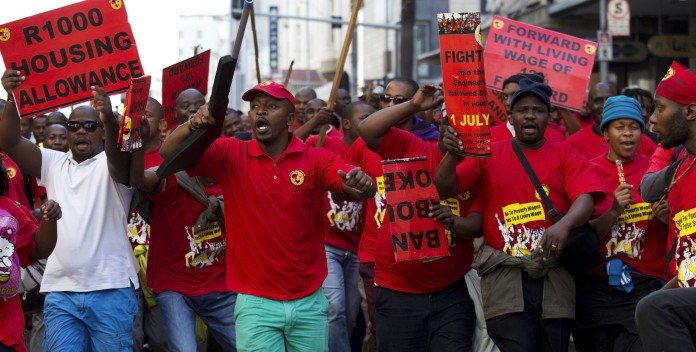
A strike on Sibanye-Stillwater’s gold mines was unlikely to take place before Christmas and was more likely to happen in the New Year according to chief operating officer Richard Stewart.
Giving a briefing to media Stewart said the group was “continuing to engage” with the unions following the deadlock on wage negotiations that was declared on November 24 but the developments were now in the final stage of the CCMA (Commission for Conciliation, Mediation and Arbitration) conciliation process.
This final stage would establish picketing rules and allow for the CCMA to inspect picketing sites. That was scheduled to happen on December 13 after which the CCMA had a week to inspect sites and then issue a certificate of non-resolution.
Stewart said once that certificate had been issued then the unions could consider a strike and the employers a lockout.
He said the finalisation of the picketing rules was critical “to ensure that picketing or any form of industrial action that should occur is done in a lawful, peaceful and orderly manner. It is aimed at preventing acts of lawlessness, violence, intimidation and damage to property.”
He commented, “calling a strike is not something we would do but I would hazard a guess that I don’t think there’s an appetite to have a strike prior to Christmas. We will continue to engage and try to avert a strike but, if there was one, I would imagine it would be in the New Year at some point. “
Stewart confirmed that Sibanye-Stillwater management was currently planning for a strike. “That’s not because it is something that we want or something that we intend or something that we expect.
“It is just responsible of us to recognise the position we are in and be able to make sure we can protect and sustain our operations for the benefit of all stakeholders in the event that it does occur”
Stewart said Sibanye-Stillwater considered it was paying a fair wage but had reached a point where “sustained and continued above inflation wage increases are simply not sustainable and will start to have severe negative consequences for our operations.”
He pointed out the unions’ demand for a R1,000 per month increase would add an additional R90,000/kg of gold produced to Sibanye-Stillwater’s ASIC (all-in-sustaining cost) over the next three years.
Stewart said Sibanye-Stillwater’s current ASIC for the year to date was R820,000/kg while the average gold price received was R838,000/kg which meant the wage demand was “clearly not sustainable in terms of maintaining our operations.”
He appealed to the unions not to strike and to continue engaging with Sibanye-Stillwater “in the interests of employees and their families who depend on them” to reach a reasonable agreement that would not jeopardise the future of the mines.











